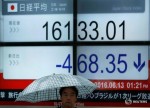
- All Instrument Types
- Indices
- Equities
- ETFs
- Funds
- Commodities
- Currencies
- Crypto
- Bonds
- Certificates
Please try another search

Too early to buy into weakness among Europe’s China proxies: Citi
 © Reuters.
© Reuters.
Investing.com -- As of September, Citi analysts urge caution on European stocks with high exposure to China, known as "China proxies."
Despite tempting valuations following declines, Citi Research analysts in a note dated Wednesday advise that it is too soon to seize on this weakness.
The fundamental challenges facing China’s economic recovery, coupled with a lack of meaningful catalysts, make these stocks a risky bet in the near term.
China’s economy has underperformed expectations in 2024, putting Beijing’s 5% GDP growth target in jeopardy.
Weakened manufacturing output, reflected in sub-50 PMI figures, and mounting deflationary pressures signal ongoing macroeconomic struggles.
While some policy support has been rolled out, such as government bond issuance and minor rate cuts, Citi does not foresee any major confidence-boosting measures that could revive the market.
“Our basket of China-sensitive stocks in Europe (Bloomberg: CGRBECHS Index) is down c7% YTD, underperforming the STOXX 600 and MSCI China,” said analysts at Citi. This lagging performance mirrors the prolonged weakness in China’s macroeconomic outlook.
The challenges have not only been reflected in stock prices but also in earnings. European companies heavily reliant on China have faced deeper earnings downgrades compared to their peers.
For instance, 2024 earnings per share (EPS) estimates for these companies have been revised down by 10% YTD, a sharp contrast to the 3% decline seen across the Stoxx 600.
Luxury goods manufacturers, technology companies, and health care firms have been particularly hard-hit, with their earnings expectations falling more drastically as Chinese demand continues to underwhelm.
This earnings decline has been accompanied by a derating in stock prices. While the Stoxx 600 has seen a positive rerating with its price-to-earnings multiples expanding by about 5% YTD, China-exposed stocks have seen a 6% contraction in valuation.
The devaluation flags a broader lack of investor confidence in these companies amid persistent economic uncertainty in China.
Several sectors, in particular, have struggled due to their heavy dependence on Chinese demand.
Luxury goods, which derive around 30-35% of global sales from Chinese consumers, have seen no significant rebound in demand.
This sector, along with others like autos and consumer staples, continues to face earnings downgrades as hopes for a Chinese consumer recovery fade.
Technology companies, including European chipmakers, are also struggling with low visibility into future Chinese demand, making it difficult for them to project a recovery. Even industrial companies, which rely on China’s factory output, have tempered expectations, with most not forecasting a recovery in China’s manufacturing sector until well into 2025.
“As such, we’re not yet buying into weakness among Europe’s China proxies,” the analysts said. The ongoing challenges in China’s economy, combined with the lack of significant policy support, suggest that further downgrades in earnings are likely.
Moreover, geopolitical risks, particularly as the U.S. approaches its 2024 election—pose an additional threat to the Chinese market and the companies that are sensitive to its performance.
As such, Citi remains cautious about recommending investment in China-exposed European stocks at this time.
However, there may be long-term opportunities on the horizon. If China’s economic situation improves or if the government takes stronger action to stimulate growth, these stocks could become attractive once again.
Lower valuations, combined with less direct exposure to the geopolitical tensions that have plagued China-U.S. relations, could set the stage for future gains. Yet, as of now, the risks outweigh the potential rewards.
Citi’s current stance reflects the broader market sentiment: it’s too early to bet on a recovery among Europe’s China proxies.
Until there is more clarity on China’s economic trajectory and stronger signs of policy intervention, these stocks remain a risky investment.
Related Articles
Are you sure you want to block %USER_NAME%?
By doing so, you and %USER_NAME% will not be able to see any of each other's Investing.com's posts.
%USER_NAME% was successfully added to your Block List
Since you’ve just unblocked this person, you must wait 48 hours before renewing the block.
I feel that this comment is:
Thank You!
Your report has been sent to our moderators for review




 Author
Author
Add a Comment
We encourage you to use comments to engage with users, share your perspective and ask questions of authors and each other. However, in order to maintain the high level of discourse we’ve all come to value and expect, please keep the following criteria in mind:
Perpetrators of spam or abuse will be deleted from the site and prohibited from future registration at Investing.com’s discretion.